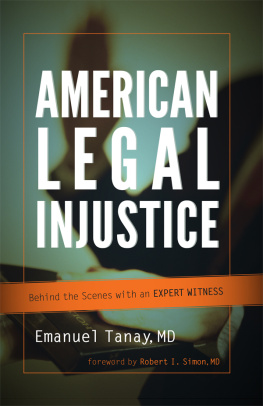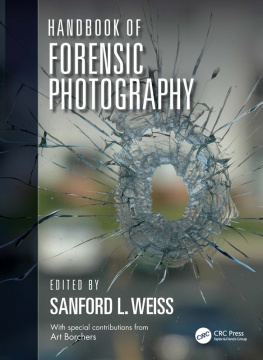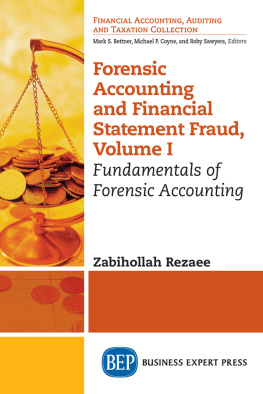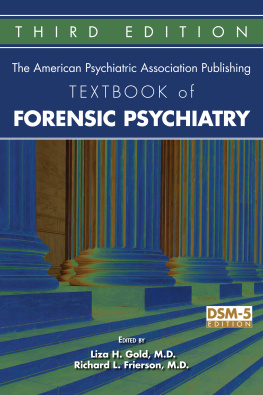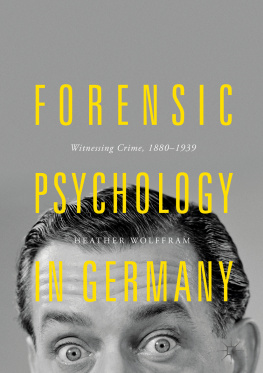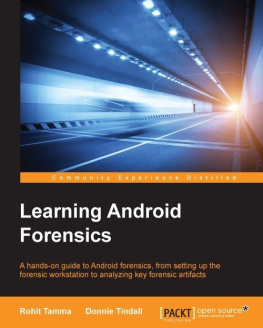Certified Forensic Consultant Body of Knowledge
American College of Forensic Examiners Institute
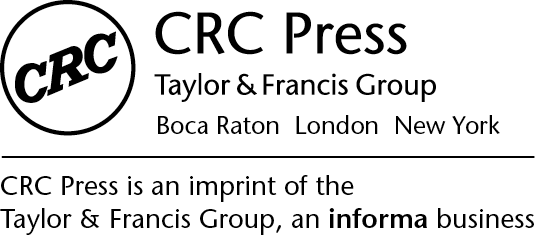
CRC Press
Taylor & Francis Group
6000 Broken Sound Parkway NW, Suite 300
Boca Raton, FL 33487-2742
2015 by Taylor & Francis Group
CRC Press is an imprint of Taylor & Francis Group, an Informa business
No claim to original U.S. Government works
Version Date: 20160126
International Standard Book Number-13: 978-1-4987-8265-4 (EPUB)
This book contains information obtained from authentic and highly regarded sources. Reasonable efforts have been made to publish reliable data and information, but the author and publisher cannot assume responsibility for the validity of all materials or the consequences of their use. The authors and publishers have attempted to trace the copyright holders of all material reproduced in this publication and apologize to copyright holders if permission to publish in this form has not been obtained. If any copyright material has not been acknowledged please write and let us know so we may rectify in any future reprint.
Except as permitted under U.S. Copyright Law, no part of this book may be reprinted, reproduced, transmitted, or utilized in any form by any electronic, mechanical, or other means, now known or hereafter invented, including photocopying, microfilming, and recording, or in any information storage or retrieval system, without written permission from the publishers.
For permission to photocopy or use material electronically from this work, please access www.copyright.com or contact the Copyright Clearance Center, Inc. (CCC), 222 Rosewood Drive, Danvers, MA 01923, 978-750-8400. CCC is a not-for-profit organization that provides licenses and registration for a variety of users. For organizations that have been granted a photocopy license by the CCC, a separate system of payment has been arranged.
Trademark Notice: Product or corporate names may be trademarks or registered trademarks, and are used only for identification and explanation without intent to infringe.
Visit the Taylor & Francis Web site at http://www.taylorandfrancis.com
and the CRC Press Web site at www.crcpress.com
CRC Press is a premier publisher of scientific, technology and medical content, reaching around the globe to publish the pioneering achievements of science that provide researchers, professionals, and students with the resources they need to make further advances. CRC Press is a member of Taylor & Francis Group, an informa business.
For more authoritative books in your field and for in-depth information about CRC Press books, visit www.crcpress.com
- Join our email list to receive exclusive, unadvertised discounts and alerts when new books publish in your field
- Visit Featured Authors to learn about your favorite author with detailed bios, news about their work, and discussions of their research
- Read the latest book reviews from industry experts, influencers, and thought leaders about STM (Science, Technology and Medicine) reference and textbooks
The tables in this ebook have been modified to enhance the reader experience. On compatible devices, the enhancement should keep the header rows visible as you scroll through a table.
Please report any issues with this ebook or any desired enhancements to the .
www.crcpress.com
Abstract
In a proper court setting, experts in various fields are asked to provide testimony and evidence on differing professional topics. To be able to effectively testify in a courtroom setting requires knowledge, training, experience, and expertise. The Certified Forensic Consultant (CFC) exam certifies an individuals knowledge of the legal system and court procedures. The exam covers the following topics: the discovery process, the forensic experts deposition, litigation processes, the trial, general legal principles, professional practices, consultation services, and expert witness payment. Materials presented in this CFC guide will prepare the reader with the necessary information to achieve this goal.
Readers will learn the complete court process, from opening arguments to the conclusion, proper fee establishment, the way to correctly testify in a professional manner, and the forensic experts role in litigation.
Prerequisites
A candidate must have a minimum of a bachelors degree with 3 years of experience in a forensic-related field, or 5 years of experience in a forensic-related field.
Key Words
- Jurisprudence
- Jurisdiction
- Negligence
- Prima facie
- Depositions
- Interrogatories
- Requests for production of documents and/or physical inspection
- Requests for admissions
- Motion for summary judgment
- Motion in limine
- Motion to strike
- Subpoena
- Subpoena duces tecum
- Voir dire
Task Statements
- Present suggestions and thoughts concerning specific litigation
- Stipulate responsibilities to attorneys
- Conclude involvement with cases effectively and appropriately
- Define deposition
- Describe the timing, potential purposes, and conduct of the deposition
- Explain the role of attorneyclient communication in preparing for and giving the deposition
- Explain the importance of practice in preparing for the deposition
- List discovery methods used by attorneys
- Explain the discovery process
- Identify the importance of discovery to attorney theories and strategies
- Explain the forensic experts role in the discovery process
- Describe the attorneys role in the discovery process
- Explain the role of effective note-taking and filing in the discovery process
- Describe discoverability rules
- Clarify the importance of retaining a copy of all testimonies given
- Explain the importance of consistency in testimony across cases
Chapter 1
Understanding the Legal System
1.1 Overview of the Court System
The Constitution of the United States mandates separation of powers between the executive, legislative, and judiciary branches of government. The legislative branch enacts laws which are referenced as statutes. The judiciary determines the constitutionality of laws and relies on prior cases to reach decisions which are pending. The executive branch enforces the laws.
When there is a conflict between two or more parties and they cannot come to an agreement, they may utilize the judiciary as a way to resolve the issue. In civil cases, the party who files a complaint is referred to as the plaintiff or petitioner. The party who is served with a complaint has the responsibility of filing an answer and is called the defendant or respondent. These cases involve monetary awards as a means of remuneration or a declaration as to what can be done in a lawful manner. In criminal cases, the public state or municipality brings the action against the defendant and involves a loss of liberty or fines meant to punish criminal wrongdoing.
Once a case is filed, it proceeds to litigation and ultimately may result in a trial. In some cases, a jury may render a decision and, in some cases, the judge would decide the result. Occasionally, one of the parties may file a motion in which the court will rule prior to a trial or during a trial. Motions to dismiss are filed if the court does not have jurisdiction to hear the case or if the complaint does not express a legal theory which can result in a verdict. The judge may rule on a motion for summary judgment if the facts are not in dispute, which would result in a particular finding without the need for a jury or fact finder to render a decision. If the party presenting their case at trial cannot sustain their burden of proof, the judge may direct a verdict in favor of the other party without the necessity of a jury reaching a decision.


